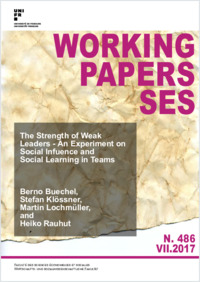The strength of weak leaders - an experiment on social influence and social learning in teams
BP2-STS
-
25.06.2017
43
Social Networks
Social Influence
Confidence
Overconfidence
Bayesian Updating
Naïve Learning
Sortition
Wisdom of Crowds
English
We investigate how the selection process of a leader affects team performance with respect to social learning. We use a lab experiment in which an incentivized guessing task is repeated in a star network with the leader at the center. Leader selection is either based on competence, on self-confidence, or made at random. Teams with random leaders do not underperform compared to rather competent leaders, and they even outperform teams whose leader is selected based on self-confidence. The reason is that random leaders are better able to use the knowledge within the team, i.e., the wisdom of crowds. We can show that it is the declaration of the selection procedure which makes non-random leaders overly influential. The central position in the communication network already makes a leader highly influential. Knowing that the leader is not selected at random pushes team members to weigh the leader’s opinion even more. We set up a horse race between several rational and naïve models of social learning to investigate the microlevel mechanisms. We find that overconfidence and conservatism contribute to the fact that too confident leaders mislead their team in finding good estimates.
- Collections
- Faculty
- Faculté des sciences économiques et sociales et du management
- Language
-
- English
- Classification
- Economics
- Series statement
-
- Working Papers SES ; 486
- License
-
License undefined
- Identifiers
-
- RERO DOC 305040
- RERO R008688997
- Persistent URL
- https://folia.unifr.ch/unifr/documents/306083
Statistics
Document views: 178
File downloads:
- Document: 232
